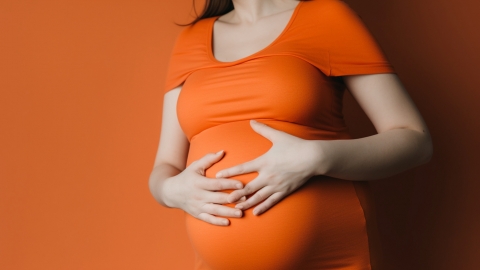What causes abdominal pain at 30 weeks of pregnancy?
Under normal circumstances, abdominal pain at 30 weeks of pregnancy may be caused by factors such as uterine enlargement, false labor contractions, urinary tract infection, cholecystitis, or threatened miscarriage. Symptomatic management through general care or medication may be necessary. If discomfort occurs, it is recommended to seek medical attention promptly and receive appropriate treatment under a doctor's guidance. Detailed explanations are as follows:

1. Uterine Enlargement
At 30 weeks of pregnancy, as the fetus grows and amniotic fluid gradually increases, the uterus expands continuously, exerting pressure and traction on surrounding ribs and skin, which may cause a dull ache in the abdominal area. No special treatment is required, but pregnant women are advised to rest adequately and avoid excessive fatigue.
2. False Labor Contractions
At 30 weeks of pregnancy, pregnant women may occasionally experience false labor contractions, which are caused by irregular contractions of the uterine muscles and may lead to abdominal tightness and pain. These symptoms usually resolve on their own. Pregnant women can alleviate discomfort by resting, changing positions, or applying heat compresses.
3. Urinary Tract Infection
During pregnancy, hormonal changes and uterine pressure increase the risk of urinary tract infections. Bacterial infection of the urethra, bladder, or kidneys can cause inflammation, resulting in pain in the lower abdomen or abdominal area, often accompanied by symptoms such as frequent urination, urgency, and painful urination. It is recommended to follow medical advice and use medications such as ciprofloxacin hydrochloride tablets, cefuroxime axetil tablets, or levofloxacin tablets to relieve symptoms.
4. Cholecystitis
Hormonal changes during pregnancy may affect gallbladder function, leading to bile stasis and gallbladder inflammation, which may cause pain in the upper right abdomen radiating to the abdominal area, possibly accompanied by nausea, vomiting, and fever. It is recommended to take medications such as anti-inflammatory and bile-promoting tablets, clindamycin hydrochloride tablets, or ursodeoxycholic acid tablets under medical guidance.
5. Threatened Miscarriage
Although the fetus is relatively stable at 30 weeks of pregnancy, if there are conditions such as embryonic chromosomal abnormalities or maternal luteal insufficiency, pregnant women may still experience symptoms of threatened miscarriage, such as abdominal pain and vaginal bleeding. It is recommended to take medications such as dydrogesterone tablets, progesterone capsules, or fetal protection tablets under medical guidance to alleviate symptoms.
Pregnant women are advised to attend regular prenatal checkups at the hospital to monitor maternal health and fetal development in a timely manner.




